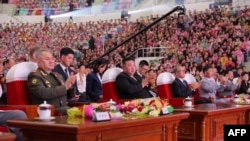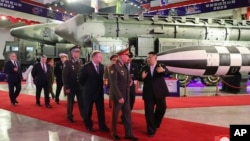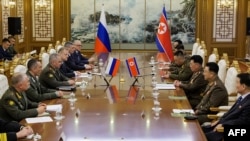North Korean leader Kim Jong Un personally received a visiting Russian military delegation and a Chinese political delegation on the eve of the 70th anniversary of the state’s self-proclaimed “Victory Day,” utilizing the occasion for diplomacy after years of isolation sealed by strict COVID-19 controls.
Russian Defense Minister Sergei Shoigu and Chinese Politburo member Li Hongzhong delivered letters to Kim from their respective leaders, Vladimir Putin and Xi Jinping, state media KCNA said Thursday. It said Kim received the letters gratefully, noting their countries’ decades of friendship.
The delegates were invited by Kim to a midnight musical performance, which celebrated the state’s long-claimed win against the “brigandish armed invasion by U.S. imperialism,” KCNA said.
The 1950-53 Korean War is referred to as the Fatherland Liberation War in North Korea, a bloody struggle that it incorrectly teaches was instigated by the United States and its allies. The 70th anniversary is one that Pyongyang needs to decorate with a significant measure of success.
Shoigu’s three-day visit has been treated prominently by North Korean media. KCNA featured reports involving the Russian defense minister Thursday, including a tour through an indoor weapons exhibit led by Kim Jong Un.
The leader showed off North Korea’s newest weaponry and equipment developed under its national defense development plan, the state television broadcaster announced, discussing trends in global weapons development and strategy.
The weaponry exhibition house featured intercontinental ballistic missiles and new unmanned aerial vehicles (UAVs), images showed. Observers in Seoul noted the UAVs appeared similar to the American-made Global Hawk, a remotely piloted high-altitude surveillance aircraft, and the MQ 9 Reaper, a hunter-killer UAV.
Kim “repeatedly expressed the belief that the Russian army and people would achieve big successes in the struggle for building a powerful country,” the state broadcaster reported.
Prior to his meeting with Kim, Defense Minister Shoigu sat down with his North Korean counterpart, according to KCNA, to exchange views on “further strengthening the strategic and traditional relations” of the two countries. And while there was no clear indication a new weapons deal was in the works, it would be one that would be produced behind closed doors.
Washington, last year on at least two occasions, said Pyongyang is covertly supplying Moscow with “a significant number of artillery shells” to fuel its war on Ukraine, a charge both North Korea and Russia vehemently denied.
“Nobody – nobody should be helping Mr. Putin kill more Ukrainians,” U.S. National Security Council communications coordinator John Kirby told reporters Wednesday. “But the fact that he’s reaching out to North Korea, or could be, additionally, that wouldn’t come as a surprise to anybody.”
The South Korean government said it is closely monitoring developments, noting that Moscow’s basic position is that it is opposed to Pyongyang’s nuclear weapons possession and the escalation of tensions on the Korean Peninsula.
Its foreign ministry spokesperson expressed hopes on Thursday that the Russian delegation’s visit will contribute to the cessation of such provocations and lead to North Korea’s return to dialogue.
Meeting needs
The significance of Defense Minister Shoigu’s high-profile visit — at a crucial phase in Moscow’s war with Ukraine — was not lost on analysts in Seoul. Shoigu’s trip marks the first cabinet-level trip since Russian Foreign Minister Sergey Lavrov came to Pyongyang in May 2018, when diplomacy between the U.S. and North Korea was more active.
The needs this time are different, as Shoigu is poised to become the first Russian defense minister to attend North Korea’s “Victory Day” military parade, expected Thursday night.
“Russia needs cooperation against the United States and the so-called Western world because we are seeing very cohesive groups [form] against Russia’s Ukraine war,” said Park Won Gon, a professor at Ewha Womans University. “And for North Korea, especially Kim Jong Un, he needs some kind of achievement to commemorate the 70th anniversary of the so-called Victory Day.”
Having not only China’s delegation but also Russia’s defense head stand side-by-side with Kim at a soon-to-be-held military parade would send a “very clear message to the North Korean people and the world that North Korea is getting support from these two countries and is no longer isolated or a rogue state,” Park added.
“North Korea is directly benefiting from the strategic environment created by the war in Ukraine,” Boo Hyeong Wook, a researcher at the Korea Institute for Defense Analyses, wrote last week. “China and Russia have lost the motivation to put the brakes on North Korea’s nuclear speeding, and there is a high probability that Pyongyang will force the status of a de facto nuclear power through highly volatile military provocations.”
China — in its choice of an envoy to North Korea’s celebrations — appears to be more muted in its support for remembrances that strike close to home. China lost hundreds of thousands of soldiers in North Korea’s fight to claim all of Korea in 1950.
Beijing’s delegation is led by Li Hongzhong, who, analysts note, is a non-permanent member of the Politburo Standing Committee. In 2018, China had dispatched to North Korea Li Zhanshu, a permanent member of its Communist Party’s top decision-making body and its third ranked official. He is now retired.






